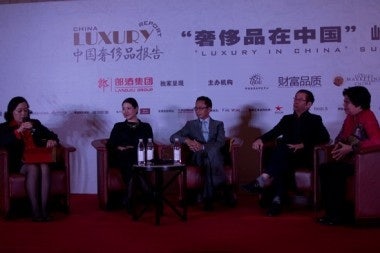"Every Brand Has To Be Involved"#

Part two of Jing Daily's Betty Chen talked with Gregory Furman, founder of the Luxury Marketing Council, who recently spoke with us about the opportunities presented to luxury marketers and brands in China, consumer education levels there, and why now is the right time for his company to enter the Chinese market. If you missed part one earlier this week,
click here to give it a read#
.
Jing Daily (JD): Do you see any differences between members of the Luxury Marketing Council in the US and its China chapter, in terms of their business goals and marketing behavior?#
Greg Furman (GF):#
Yes. There are several ways to answer that. One, you can look at from a corporate standpoint. Two, you can look at from a media infrastructure and sophistication of media perspective. Three, I think you have to look at it from a standpoint of where the customer is, both in China and globally.
Historically, what global brands have done in China is put a stake in the ground and said, "We are going to be there, we are going to learn on the ground. We don't know everything, but we know the best way to learn something is to go there and figure it out." I think that's historically what most of the brands there have done, and some have done a better job and been smarter than others. There are possibly ways we can bring people together, so those people who have been there can share what they've learned and make it easier for other brands that are coming in to be smarter about accessing the Chinese market.
China is new, beautiful and interconnected. But on the other hand, so far the sophistication of media -- in terms of magazine, newspaper, TV, and editorial content -- relative to where we are is very different. I think China is still in an early phase in terms of trying to understand media, marketing and advertising, and how to reach and influence the best customer. So that's a big challenge. That's something I think we can figure out together.
The last piece is about consumers. If you look at the research, the best thing I've seen on the consumer side is the work that American Express has done with the Harrison Group. They defined four categories of sophistication, in terms of how people regionally and globally buy and think about buying, and where they are in their mindset about buying luxury. The four categories from the most nouveau to the most sophisticated are
acquisitive#
,
inquisitive#
,
authoritative#
, and
meditative#
. What they are saying is that China, Russia, and maybe India are acquisitive. The bigger the brand, the more you can brag about how much it costs, and the happier you are. Show and display. That's acquisitive.
Inquisitive is not so much about showing off anymore. "I want more to know why it's worth of money I'm paying, and what constitutes the great piece of fine jewelry, the great travel experience , the great dinner, the great wine. I am curious." That's inquisitive, and it's an early learning stage.
Authoritative is not even too much about stuff. It's about quality, value, understanding, and appreciation -- I don't care about travel agents, I got an opinion too. It's much more about the interrelationship between price and value. That's where America, Europe and Japan are living, and going forward to meditative since the 1970s.
Meditative is nothing to do about stuff. It's spiritual. It's more about experience and what's really unique. It's much less materialistic. The interesting thing is that it took Europe, Japan and the US about 40 years (since the 1970s) to move up that food chain from acquisitive to meditative. Most of the research shows that it will only take China 15 years or less to be meditative because the hunger to know is so pronounced.

JD: How do luxury brand meet the demands of Chinese consumers?#
GF:#
One of the great statistics from the presentation made by Fortune Character [in Shanghai last month] showed that Chinese luxury consumers are ten years younger than any other luxury consumer in the world. So all of the sudden the country has an incredibly robust and intelligent population. They are going to be at a very sophisticated level very soon, so brands are going to have to keep pace with them. Brands have to meet that at a store level, with a level of sophisticated patience and service. The customers there are going to be smarter and demand more, so brands have to meet their rising tastes.
One of the other issues for many brands is that there is a whole mid-management gap. If you look at some of the studies, one of the issues for brands is people in China at a mid-management level are very good at implementing and taking orders, or following doing the right thing. People there are very scrupulous. But culturally speaking, some research shows that brands have had a hard time in terms of getting people to take risks and make recommendations. Part of the job for mid-level managers in Europe, the US and Japan is to think about the business, so China has a massive challenge in terms of educating people in understanding the whole structure of management. That type of education is one of the things the [Luxury Marketing] Council would like to talk about.
JD: Do you see any members in the US interested in forming relationships with Chinese companies to sell their products in China and vice versa?#
GF:#
I think every brand has to be involved. If you are a global brand, you have to be there. For brands in China, I think it's the same, and this is interesting. For example, Shanghai Tang is one of them. One of the issues for mainland China is that a Chinese brand that wants to have a global luxury presence needs to raise its levels of sophistication and product service. Another special resource is the Web. I think there are enormous opportunities for young designers from around the world in this regard. That's a part we think we could play a role in.
JD: Do you have any specific ideas, in mind in terms of bringing them together?#
GF:#
Yes. Let's meet some here, and bring them to China. Let's meet them in China, and bring them to the US. Let's have the Council bring some of the smartest Chinese designers here and let our members meet them and introduce them to one another. We can get some universities involved. Sometimes very simple things are very powerful. You have to find people and you have to have people help you find people, and then bring them together. Bring the right people together, do simple things, and duplicate them.
JD: The first "China's Luxury Report" by the Luxury Marketing Council, UIBE (University of International Business & Economics) and Fortune Character made its debut at the Luxury Market in China summit. Do you have any plans to distribute the report here?#
GF:#
The report is great and it was a very good presentation. I think we are going to distribute it here once it's translated.
JD: What's your personal perspective of the Chinese luxury market? Compared with the US luxury market, what kinds of differences do you see in terms of the culture of luxury and consumer attitudes?#
GF:#
From the standpoint of the growth of the market, if you look at studies like the ones McKinsey has done about China, they are saying confidently that by 2015 China will account for 25 percent of global purchases of all luxury products and services. The other thing they are saying is by 2025 China will account for 50 percent.
That's just one perspective. Another perspective is from the standpoint of the development of consumers, in terms of migration from acquisitive to inquisitive to authoritative to meditative. In 10 years, they are going to be further up the food chain, so the pressure will be on brands to sell to Chinese consumers face-to-face and through more sophisticated marketing vehicles. That's going to be a revolution, and it's happening very quickly.
In China, there are 200 or 300 big cities. Many brands thought going into different cities in China would be just like going to different cities in the US. In fact, it's more like traveling between Italy, Germany, and England all within China. Cities in China are so different, culturally. A brand that works in a city equivalent to New York does not mean it's going to work in a city equivalent to London or Paris. One of the challenges for brands is to understand the culture and differences of big cities where they have opportunities, in terms of taste, color and style. My point is, stylistically there are differences in China city by city. So brands have to figure that out.
Media is another major thing we need to discuss. Brands need to be sophisticated in knowing what advertising means in China -- how do you reach the right people, how do you segment the population by lifestyle -- and it's a very early phase in China now. Then there's issues of privacy, openness, freedom of information and exchange: Where is the government playing in that and how much is appropriate, how can brands capture information and be allowed to use it? One thing I know is that not too long ago, luxury advertising was banned [in Beijing] and companies were at risk of being fined for using the world "luxury."
I think wealth disparity in China is also something that brands should address. It's not a major issue only in China, but globally. Brands need to be more sensitive and have a greater sense of consciousness.
Special thanks to Gregory Furman and the Luxury Marketing Council.#
